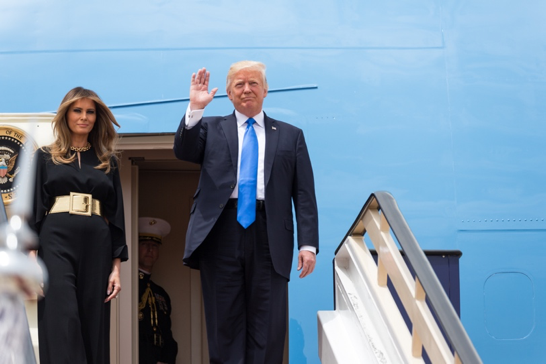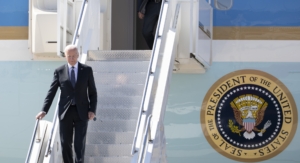The Trump Doctrine, Mayors Fight the Future, and New Student Debtors
Here’s What You Need To Know
Last week, President Trump gave his first major foreign address in Saudi Arabia in front of leaders from 55 Muslim-majority countries. While the speech received plenty of coverage, much of the reporting missed the most important element – President Trump laid out the foundation of a new foreign policy doctrine that could reshape diplomacy in the Trump era.
- “Principled Realism”: The overarching philosophy behind the Trump Doctrine is this idea of “principled realism,” which the President explained as pursuing American foreign policy goals through partnerships favoring stability over radical disruption, focusing on real-world outcomes not inflexible ideology, and prioritizing partnerships over perfection. The policy is a further fleshed out version of Trump’s campaign promise of an “America first foreign policy,” not disengaging from global diplomacy, but placing U.S. economic and security interests above all else.
- Prioritizing Security: The Trump Doctrine places an emphasis on U.S. national security and seeks to achieve this goal through a combination of partnership efforts. First, President Trump has acted on his belief in working with, sometimes, imperfect partners. The Trump Administration has sought to form even closer ties with countries like Saudi Arabia, Egypt, and the Philippines. All of these nations have questionable track records on human rights issues, but play an important role in maintaining global stability. Second, the President is demanding more of America’s long-time allies, when it comes to the issue of global security. While speaking to NATO leaders yesterday, the President bluntly reiterated his calls for member nations to pay their fair share to support the international security pact.
- Trade As An Economic Issue: In the post-Cold War era, American presidents of both parties have sought to use international trade as a force for policy objectives ranging from human rights to promoting democracy to environmentalism. The Trump Doctrine takes a much more straight-forward approach to international trade, viewing it purely as a tool for economic growth. Through their efforts to renegotiate NAFTA, withdraw from TPP, and potentially review the South Korean trade deal, the Trump Administration has made clear their trade policies will be informed primarily by how they impact the U.S. economy.
- Why It Could Work: As influential academic Walter Russell Mead recently noted in The Wall Street Journal, “American voters have never shared the establishment’s enthusiasm for a foreign policy aimed at transforming the post-Cold War world.” There is, Mead argues, a “disconnect between the establishment’s ambitious global agenda and the limited engagement that voters appear to support.” Trump’s approach to the world, often hinted at during the campaign and telegraphed in his Inaugural Address, is a response to this disconnect, much like his economic policies are shaped by the disconnect on priorities between many in Washington and the “forgotten man” in the heartland.
President Bush’s approach, whether you believe it was right or wrong, exhausted the American people’s willingness to spend blood and treasure abroad. President Obama swung the pendulum too far in the other direction, declaring he would “lead from behind” and seek ways to leave Iraq and Afghanistan even if our mission was not completed. Trump’s approach may find a more careful balance – engaging in the world only when he can clearly articulate America’s immediate interests in doing so. Only time will tell if he gets the balance right.
News You Can Use
ACTING AGAINST THE ACTIVISTS
Subscribe to Receive Insights
"*" indicates required fields
Resolute Forest Products’ vice president, Seth Kursman, recently published an op-ed calling on more businesses to fight back against attacks from certain activist groups the way his company did when they were targeted by Greenpeace. Kursman argues major companies with legitimately good records need to stand up to activists who actually brag about how quickly major corporations capitulate to their demands.
The natural instinct of most companies has been to take the abuse from these activist groups, regardless of how absurd or illegitimate their claims are. But Kursman points out that this only encourages these groups to continue using these tactics to bully good corporate citizens. Kursman’s company successfully sued Greenpeace for making false claims and targeting them, and he is now encouraging other falsely targeted companies to do the same.
MAYORS AGAINST THE FUTURE
New York City’s deputy mayor for housing and economic development, Alicia Glen, has gathered leaders from 22 cities around the world to discuss how they can assert their regulatory authority over the major tech firms of the so-called “gig economy” – like Airbnb and Uber. Glen’s idea is for these cities to band together and create collective set of policies that would force companies into regulatory submission, cutting off their ability to simply refocus on a municipality with a more attractive regulatory set-up.
The themes of Glen’s meetings will include fair compensation, health and safety standards, environmental sustainability, equal opportunity, and data security. It is an open question whether these cities can agree on policies and use their numbers as leverage, but an international regulatory cartel could present a major challenge to tech companies’ growth.
WHY DO YOU “VOLUNTOUR”?
It turns out that “voluntourism” – a growing form of tourism in which travelers participate in voluntary work, typically for charity – actually does more harm than good. First, a growing number of “voluntourists” often have the wrong motives: they travel overseas to look good to others rather than help those in need. Those who do want to help sometimes have a condescending savior complex that implies the locals are helpless. Second, the growing industry of “voluntourism” has led to a rise in organizations designed to make money from poverty and who often market their business using stereotypes.
Third, research is beginning to indicate that short-term “voluntourists” often leave vulnerable children feeling abandoned when what they need stable, long-term relationships. Finally, “voluntourists” often take on jobs overseas for which they do not have the skills. If you wouldn’t trust a “voluntourist” to build a school in your own country, why do we encourage them to do it in someone else’s? This trend is just the latest example of a societal shift toward virtue signaling— seemingly selfless acts that are really only done to signal an ideological view point to others, rather than a genuine desire to be virtuous and help those in need.
STUDENT DEBT: IT’S NOT JUST FOR MILLENNIALS
There is a macroeconomic tsunami of student debt carrying over to the parents of Millennials and it is still unclear what impact this new debt crisis may have on the overall economy. The most up to date New York Fed data suggests that from 2005 to 2015, student loan debt held by Americans aged 60-64 increased from $4.85 billion to $38.35 billion. For those aged 55-59, it increased from $13.9 billion to $65.47 billion. Statistics also show Baby Boomers are having just as much trouble as Millennials paying off this debt, with many of these loans already in default.
While no one has crunched the numbers to accurately assess its impact on the U.S. economy, these rising levels of student debt will undoubtedly have ripple effects, ranging from 60% of Boomers in this position admitting they are putting off buying a new home or those in their 50s and 60s working later into life. Both of these consequences further exacerbate the economic plight of younger generations, but also prove that the issue of crippling student debt is not a single generation problem. That is why more and more political leaders will offer solutions to the student debt crisis. It is no longer just pandering to the youth vote, but rather a broad issue impacting many working families.
FINANCE FINDS ITS PLACE IN THE SUN BELT
Finance and insurance jobs in the United States have now rebounded to pre-financial crisis levels, but many of the sector’s new jobs are not in lower Manhattan or Connecticut. These jobs are mostly in Arizona and Texas. New technology driving the rise of online banking allows financial firms to consider locations outside traditional commerce hubs that have a substantially lower cost of living. While New York remains home to a substantial portion of the finance and insurance industry, more and more of those Wall Street “fat cats” will be far removed from island of Manhattan.



